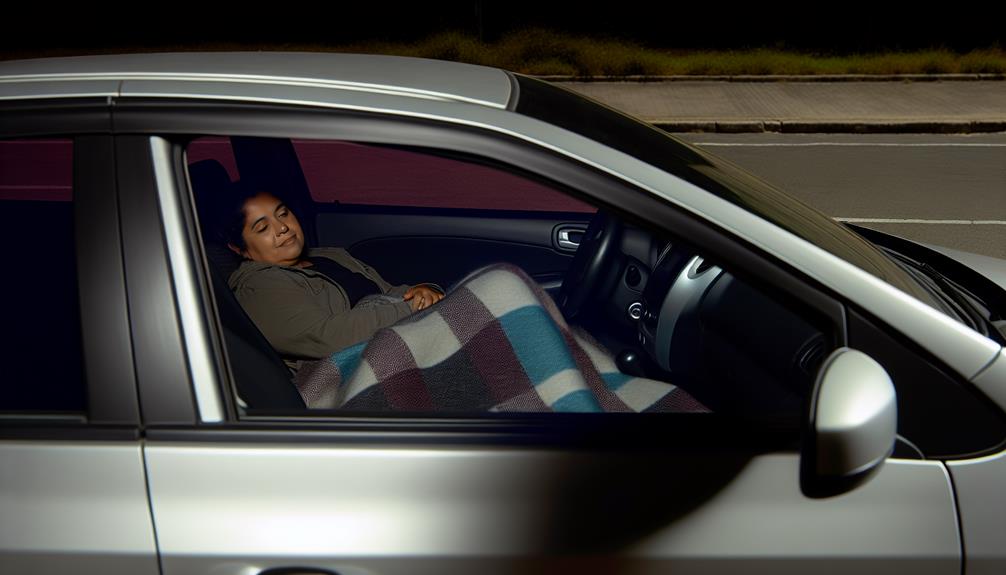The question of whether one can sleep in their own car may seem straightforward, yet the answer is not as clear-cut as one might assume.
While it is generally permissible to rest in your vehicle, various legal and safety considerations come into play that could complicate the matter. Understanding the laws and regulations surrounding this practice is crucial, as well as being aware of potential restrictions that may exist.
So, before you settle in for a nap behind the wheel, it's essential to be well-informed to ensure a peaceful night's rest.
Key Takeaways
- Sleeping in your car is subject to legal regulations and privacy rights.
- Safety and comfort considerations are crucial for car sleeping.
- Understanding prohibitions and restrictions on car sleeping is essential.
- Consider alternatives like camping facilities or hostels for a more comfortable rest.
Legalities of Sleeping in Your Car
Sleeping in your own car raises various legal considerations that depend on the specific laws and regulations of the jurisdiction in which you are parked. When it comes to privacy rights, individuals sleeping in their cars must be aware that laws regarding privacy can vary significantly from one place to another. In some jurisdictions, sleeping in a car may be considered a violation of privacy rights if done in a public space where individuals have a reasonable expectation of privacy.
Moreover, the legality of sleeping in a car in public spaces is another crucial aspect to consider. Laws governing public spaces may dictate whether sleeping in a car is allowed or prohibited. While some areas may permit overnight parking in certain locations, others may have strict regulations against it due to safety or sanitation concerns. Therefore, individuals opting to sleep in their cars should familiarize themselves with the specific laws and regulations of the jurisdiction they are in to avoid any legal issues related to privacy rights and the use of public spaces.
Safety Considerations for Car Sleeping
Ensuring the safety of individuals who choose to rest in their vehicles is paramount due to the unique challenges posed by this sleeping arrangement. Privacy concerns are a significant consideration when sleeping in a car, especially in public areas. It is crucial to park in well-lit, populated areas to minimize the risk of unwanted attention or intrusion. Additionally, using window covers or tinted windows can offer added privacy.
Weather conditions play a crucial role in the safety and comfort of car sleeping. Extreme temperatures, whether hot or cold, can pose health risks to individuals inside a vehicle. It is essential to be prepared with appropriate bedding and clothing for the prevailing weather conditions. In cold weather, layers of blankets and warm clothing are necessary, while in hot weather, adequate ventilation and hydration are key to staying safe.
Tips for Sleeping Comfortably in Your Car
When looking to enhance the comfort of sleeping in your car, it is essential to consider various practical strategies and adjustments. To make your car a cozy sleeping space, you can utilize camping gear and accessories designed for outdoor comfort.
Here are some tips for sleeping comfortably in your car:
- Invest in a quality sleeping bag: Choose a sleeping bag suitable for the climate you will be in to ensure a good night's rest.
- Use camping pads or air mattresses: Adding a layer of cushioning can significantly improve your sleeping experience in the car.
- Install privacy curtains: Privacy curtains can help block out light from outside and provide a sense of security while you rest.
Prohibitions on Sleeping in Vehicles
Instances of prohibitions on sleeping in vehicles are regulated by various laws and regulations in different jurisdictions. When it comes to public spaces, many cities and counties have ordinances that prohibit sleeping in vehicles to address concerns such as public safety, sanitation, and urban blight. On the other hand, sleeping in vehicles on private property is typically governed by the property owner's rules or local zoning regulations.
To provide a clearer understanding, the table below outlines common scenarios where prohibitions on sleeping in vehicles may apply:
| Scenario | Prohibition | Enforcement | Consequences |
|---|---|---|---|
| Public Parking Lots | Prohibited in most urban areas to deter loitering and maintain security | Enforced by local law enforcement | Fines or vehicle towing |
| Residential Neighborhoods | Often restricted to maintain neighborhood aesthetics and safety | Enforced through complaints or neighborhood watch | Warning or citation from local authorities |
| Commercial Properties | Prohibitions may be in place to prevent unauthorized use of parking spaces | Enforced by property management or security personnel | Trespassing charges or fines |
Alternatives to Sleeping in Your Car
Consider exploring alternative accommodations rather than sleeping in your car to ensure a safer and more comfortable rest. When looking for options other than your vehicle, you can consider the following:
- Camping Options: Camping can be a great alternative to sleeping in your car. Many campsites offer facilities like restrooms, showers, and designated camping spots. Being surrounded by nature can also provide a peaceful and relaxing environment for a good night's sleep.
- Hostel Accommodations: Hostels are budget-friendly accommodations that provide a bed for the night along with shared facilities like bathrooms and common areas. They are a popular choice for travelers looking for affordable and social accommodation options. Hostels can offer a more secure and comfortable sleeping arrangement compared to a car.
- Short-Term Rentals: Renting a room or apartment for a night can also be a good alternative. Websites and apps offer short-term rental options that can be cost-effective and provide a cozy environment for a restful night.
Frequently Asked Questions
Can I Be Fined for Sleeping in My Car in a Public Parking Lot?
Sleeping in your car at a public parking lot can raise safety concerns and be subject to fines depending on local laws. Consider seeking support from homelessness services for safer alternatives and to address housing needs.
Are There Any Specific Laws Regarding Sleeping in a Car on Private Property?
When considering legal implications and property rights pertaining to sleeping in a car on private property, it is crucial to adhere to local regulations. Understanding zoning laws, lease agreements, and potential trespassing issues is essential.
Can I Be Charged With Trespassing if I Fall Asleep in My Car on Someone Else's Property?
Legal implications of falling asleep in your car on someone else's property may lead to charges of trespassing. Property rights are protected, and unauthorized presence can be construed as a violation, potentially leading to legal consequences.
Are There Any Regulations on How Long I Can Sleep in My Car in a Certain Location?
Regulations on sleeping in cars vary by location. To address safety concerns and homelessness issues, some areas limit the duration of car stays. Understanding local laws and seeking designated areas can help mitigate potential legal and safety risks.
Can I Be Arrested for Sleeping in My Car if I Am Parked Legally?
While parked legally, sleeping in a car can lead to arrest due to safety concerns or local ordinances. This highlights the intersection of vehicle habitation and homelessness issue, prompting a need for compassionate solutions.
Conclusion
In conclusion, the legality of sleeping in one's own car varies by jurisdiction, with safety considerations and comfort being important factors to consider.
While there may be prohibitions on sleeping in vehicles in certain areas, there are alternatives available for those in need of rest.
It is recommended to familiarize oneself with local laws and regulations before deciding to sleep in a car.
Remember, a car is not a hotel, but it can serve as a temporary refuge for the weary traveler.

